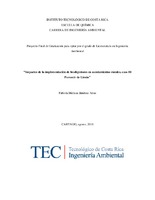Impactos de la implementación de biodigestores en asentamientos rurales, caso El Porvenir de Limón
Resumen
The production of biogas by means of low-cost biodigesters allows families in agricultural rural areas to contribute to their economic conditions by having their own energy source to cover basic needs, as well as a biofertilizer that helps to increase the productivity of crops. In this way, health conditions and quality of life of families are improved, while environmental benefits are also available. The present work exposes the management carried out by the owners to the biodigesters, evidencing the main difficulties that the families have in the operation and maintenance of the systems, contrasted by the manifestation of the interest of the owners in the biodigester because of the biogas and the potential uses in agricultural production. For this, surveys were carried out to families that had a biodigester and establishing a diagnosis of each system. On the other hand, the consumption of biogas and the repercussions that the change of energy sources provides resulted in the mitigation estimate of 65,2 tCO2eq/year, and the annual economic savings per family. In addition to this, the effluent wastewaters were characterized with the objective of knowing the decrease of the pollutant load. The results show that after treatment in the biodigester, the swine wastewater complies with the limits established in the national regulations, reaching an average BOD of 77,1 mg/L; also have essential nutrients for the development of plants, mainly potassium and nitrogen, making it a potential biofertilizer. Finally, experimentation with different dilutions of biol indicates an increase in corn crop yield as its application increases, thus generating products with greater commercial potential; likewise, there was a tendency to improve soil quality.
Descripción
Proyecto de Graduación (Licenciatura en Ingeniería Ambiental) Instituto Tecnológico de Costa Rica, Escuela de Ingeniería Ambiental, 2018.


